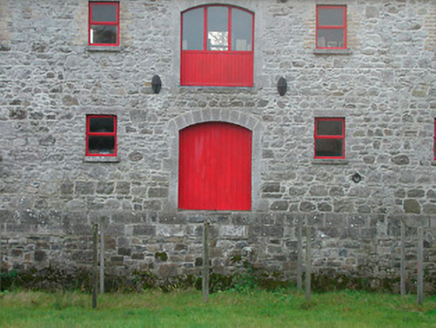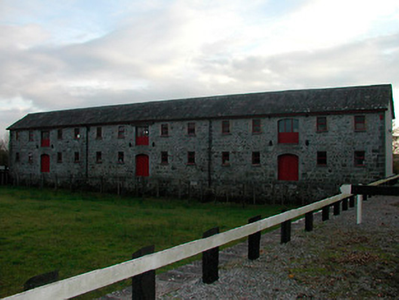Survey Data
Reg No
15403817
Rating
Regional
Categories of Special Interest
Architectural, Historical
Original Use
Store/warehouse
In Use As
Apartment/flat (converted)
Date
1830 - 1835
Coordinates
234601, 234886
Date Recorded
03/11/2004
Date Updated
--/--/--
Description
Detached fifteen-bay two-storey former canal warehouses and stores, built c.1833, restored and converted to private apartments and workshops by FAS, c.1990. Pitched natural slate roof with clay ridge tiles and cast-iron rainwater goods. Constructed of roughly coursed limestone rubble with dressed limestone detailing/dressings to the openings. Square-headed window openings with dressed stone and brick surrounds, cut stone sills and replacement top hung timber casement windows. Segmental-headed loading bays with replacement timber sheeted doors to the third, eight and thirteenth bays. Cast-iron tie-bars at first floor level flanking loading bay openings. Sited on the south quay of The Grand Canal Terminus Harbour (15403816). Small disused crane to site. Located to southeast of Kilbeggan.
Appraisal
A substantial, well-built and attractive complex of canal warehouses and stores, which retains its original form and much of its original fabric. The form of this complex suggests that the two five-bay sections to either end (east and west) were originally built as two separate buildings with the central five-bay section then added at a subsequent date. They were originally used to store agricultural produce and manufactured goods (mainly from the distilling, brewing and the tobacco processing industries, which were important in the Kilbeggan region at the time the canal was constructed) and helped to encourage economic prosperity in south Co. Westmeath in during the early-to-mid nineteenth-century. These warehouses are of considerable historical and social significance as a part of the extensive canal network that was developed in Ireland in the late eighteenth and early nineteenth-century. They were built as part of The Grand Canal (Kilbeggan Branch), which was constructed between 1830-36 by the noted engineer William Dargan. This canal was officially closed in 1961 but had been out of use from the end of the nineteenth century due to competition from the railway and road transport networks.



